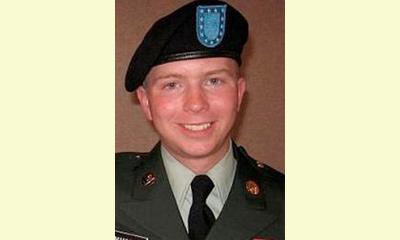|
|
International Peace Bureau awards the Sean MacBride Peace Prize to US whistleblower Bradley Manning
un articulo por International Peace Bureau
The International Peace Bureau is delighted to
announce that this year’s Sean MacBride Peace
Prize is to be awarded to Bradley Manning, the US
whistleblower whose case has attracted worldwide
attention, for his courageous actions in revealing
information about US war crimes. His trial is
likely to be concluded in the coming days.

Bradley Manning
click on photo to enlarge
Manning was arrested in May 2010 after allegedly
leaking more than 250,000 U.S. diplomatic cables,
400,000 U.S. Army reports about Iraq and another
90,000 about Afghanistan, as well as the material
used in the “Collateral Murder” video produced by
WikiLeaks: videos of the July 12, 2007 Baghdad
airstrike and the 2009 Garani airstrike in
Afghanistan. At the time, it constituted the
largest set of restricted documents ever leaked to
the public. Much of it was published by WikiLeaks
or its media partners between April and November
2010.
Manning has so far been detained for three years
— first in Kuwait, then in solitary confinement at
the Marine Corps Brig in Quantico, Va., and
finally at a medium-security military prison at
Fort Leavenworth, Kan. —before being charged with
22 offenses, including communicating national
defense information to an unauthorized source and
aiding the enemy. He pleaded guilty in February
2013 to 10 of the 22 charges, which could carry a
sentence of up to 20 years. A full life sentence
is now also possible.
IPB's Co-President Tomas Magnusson comments: “IPB
believes that among the very highest moral duties
of a citizen is to make known war crimes and
crimes against humanity. This is within the broad
meaning of the Nuremberg Principles enunciated at
the end of the Second World War. When Manning
revealed to the world the crimes being committed
by the US military he did so as an act of
obedience to this high moral duty”. It is for this
reason too that Manning has also been nominated
for the Nobel Peace Prize. In more general terms
it is well known that war operations, and
especially illegal ones, are frequently conducted
under the cover of secrecy. To penetrate this wall
of secrecy by revealing information that should be
accessible to all is an important contribution to
the struggle against war, and acts as a challenge
to the military system which dominates both the
economy and society in today’s world. IPB believes
that whistleblowers are vital in upholding
democracies - especially in the area of defense
and security. A heavy sentence for Manning would
not only be unjust but would also have very
negative effects on the right to freedom of
expression which the US claims to uphold.
The prize has been
awarded each year since 1992 by the International
Peace Bureau (IPB), founded in 1892. Previous
winners include: Lina Ben Mhenni (Tunisian
blogger) and Nawal El-Sadaawi (Egyptian author) -
2012, Jackie Cabasso (USA, 2008), Jayantha
Dhanapala (Sri Lanka, 2007) and the Mayors of
Hiroshima and Nagasaki (2006). It is named after
Sean MacBride, a distinguished Irish statesman who
shared the 1974 Nobel Peace Prize, and is given to
individuals or organisations for their outstanding
work for peace, disarmament and human rights.
|








|
DISCUSSION
Pregunta(s) relacionada(s) al artículo :
Do whistleblowers have full human rights?,
The courage of Mordecai Vanunu and other whistle-blowers, How can we emulate it in our lives?
* * * * *
Comentario más reciente:
Here is the statement of Human Rights Watch in response to the sentencing of Bradley Manning.
UPDATE: On August 21, 2013, a US court martial at Fort Meade, Maryland, imposed a 35-year-sentence on Pfc. Bradley Manning.
“The aggressive prosecution and harsh sentencing of Manning not only contrasts sharply with the total impunity of former senior US officials for torture and related abuses, but also far exceeds the sentences most democratic countries impose for public leaks of sensitive information,” said Dinah PoKempner, general counsel at Human Rights Watch.
On July 30, 2013, Pfc. Bradley Manning was convicted of 19 of 22 counts by a US court martial in Fort Meade, Maryland, for leaking thousands of government documents to the online publisher Wikileaks for public dissemination. The military judge, Col. Denise Lind, acquitted Manning of the most serious charge, “aiding the enemy.” The cumulative charges could amount to 136 years of prison time for Manning. The sentencing phase of his trial will begin on July 31.
The US government decided to proceed with prosecuting Manning after he pled guilty to 10 charges, carrying a total maximum sentence of 20 years in prison. The government accused Manning under the Espionage Act of disclosing sensitive national defense-related information to an unauthorized party, Wikileaks – essentially what Manning had already confessed.
Under the Espionage Act, the government did not have to prove that the information actually harmed national security, nor could Manning defend himself by showing the information was of strong public importance. . ... continuación.

|
|









